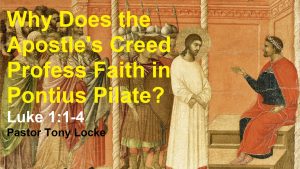Reformed Theology
God Never Leaves a Job Half Done — 1 Thessalonians 5:24
September 25th, 2016 at the First Presbyterian Church of Tucker 1 Thessalonians 5:24 He who calls you is faithful; he will surely do it.[1]English Standard Version There are no greater promises in the Bible regarding our salvation than a verse like this. That He who calls you is faithful; he will surely do it. I…
Read MoreDespise NOT Prophesying — 1 Thessalonians 5:20
August 21st, 2016 1 Thessalonians 5:19 Everybody on this planet hears the voice of God speaking to them about His glory. Psalm 19:1-4 The heavens declare the glory of God, and the sky above proclaims his handiwork. 2 Day to day pours out speech, and night to night reveals knowledge. 3 There is no speech, nor…
Read MoreWhy Does the Apostle’s Creed Profess Faith in Pontius Pilate? — Luke 1:1-4
Reverend Anthony R. Locke June 27th, 2010 at the First Presbyterian Church of Tucker Luke 1:1-4 Apostle’s Creed Series 10 English Standard Version 1 Inasmuch as many have undertaken to compile a narrative of the things that have been accomplished among us, 2 just as those who from the beginning were eyewitnesses and ministers of…
Read MoreWhy a Trinitarian Benediction? — 2 Corinthians 13:14
Reverend Anthony R. Locke May 30th, 2010 (Trinity Sunday) at the First Presbyterian Church of Tucker 2 Corinthians 13:14 English Standard Version The grace of the Lord Jesus Christ and the love of God and the fellowship of the Holy Spirit be with you all. The Trinity is one of those distinctively Christian doctrines that separate us from…
Read MoreIs My Bible Reliable?
Reverend Anthony R. Locke March 20th, 2011 www.FirstPresTucker.org at the First Presbyterian Church of Tucker Are English Bible’s the Word of God? Psalm 119:89-96 Do I hold in my hand the Word of God? English Standard Version 89 Forever, O Lord, your word is firmly fixed in the heavens. 90 Your faithfulness endures to all generations; you…
Read MoreA Place Prepared for the Devil — Revelation 20:7-10
Sermon Series in Revelation # 41 Revelation 20:7-10 7 And when the thousand years are ended, Satan will be released from his prison 8 and will come out to deceive the nations that are at the four corners of the earth, Gog and Magog, to gather them for battle; their number is like the sand of…
Read MoreInfant Baptism: How My Mind Has Changed by Dennis E. Johnson
In 1994 one of our daughters, while away from home attending college, asked me to explain the rationale I saw in God’s Word for baptizing the infant children of believers. Since I was a minister in the Orthodox Presbyterian Church when she and her siblings were born, they had all been baptized as infants; but…
Read MoreWhy We Baptize the Children of Believers
“Why does your church baptize infants?” This is a question that is often asked by visitors to Reformed and Presbyterian churches. Since the historic practice of baptizing the children of believers is largely a foreign concept to the vast majority of evangelicals today, accepting this doctrine can be a difficult hurdle for a family that…
Read MoreDo Rocks and Fossils Take a Long Time to Form?
From grade school to college, we are taught that rocks and fossils take a very long time to form and that they are proof that the earth is hundreds of millions of years old. Part of the process of creating fossils is for the soil, dirt or sand surrounding the object to harden into rock.…
Read MoreThe Powerful Legacy of William Tyndale
by Reverend Anthony R. Locke Psalm 56:1-13 English Standard Version 1 To the choirmaster: according to The Dove on Far-off Terebinths. A Miktam of David, when the Philistines seized him in Gath. Be gracious to me, O God, for man tramples on me; all day long an attacker oppresses me; 2 my enemies trample on me all…
Read More







